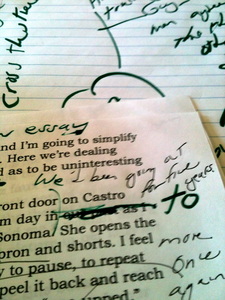
Although I had traveled to Cuba to view the unfamiliar, I had continued to see as I often do, with “old eyes,” apprehensive, not quite trusting any discoveries about Cuba or myself. Yet once back in the safety of my San Francisco surroundings, I decided to risk giving new eyes another try although I would not have to go far, only a few blocks, for this different way of looking.
I feel apprehensive as well as excited to sit at the dining room table of a much admired and published writer on a Sunday afternoon, three of my blog posts cum essays spread in front of us. This writer said that when I came back from Cuba, I could buy an hour of consultation with her, during which she will help me look at my writing and perhaps discover a next step as a writer.
With several books on bookstore shelves, including a memoir and a book on how to write, she can, I hope, give feedback that could point me in a fresh direction. Perhaps she will see such potential or raw talent that she may even ask me to enroll in her upcoming memoir workshop. Maybe even suggest a scholarship.
In addition to wishful thinking, I have told myself that this is a chance to be vulnerable, to look at my own outpourings from a professional perspective and accept criticism without flinching.
After we shake hands and sit down, she clips her take-apart glasses together over her nose and reaches into a jar of ballpoints, pencils and colored markers from which she chooses green to scrawl across my printed pages, crossing out words and lines as well as circling paragraphs as she searches for what she thinks should be the pith of each piece. As she reads, she asks questions, mostly “Why?’
It seems that my work here is to respond to the why. Why those particular words? Why lime green instead of chartreuse? Why had I never told my girl friend in the five years we were sweeties that the way she dressed sometimes made me squirm? Why had I substituted my niece’s real name with Turquoise and not Jade or Ruby?
Flipping through the three blog posts I have printed out for her, she dismisses “Dog is Love,” noting that no one wants to read about the death of someone else’s old dog even if that dog is a pit bull with cancer and the reason your son can love you. Too sentimental, limited appeal. But she does recommend a paragraph near the end as a likely beginning should I consider a rewrite.
She wants me to look at each piece of my writing with fresh eyes and discover what one thing I really have to say. I’m glad I like to revise, even more than I enjoy struggling through a first or second draft.
But when I see her cross out the entire first paragraph of “Should Happens” with a green slash, I gasp. I see that without the first paragraph, the second paragraph just hangs there. There’s revision and there’s major surgery. “Don’t write about writing,” she directs, as the green marker continues its relentless progress, unless it’s a book about writing. It will not be interesting, slash, to anyone but the writer. In the margin of page two she scribbles dialogue I might include once I undertake this particular revision.
As the green marker zips across each page, she chuckles at a phrase or a footnote. In those moments, I relax about the colorful cross outs and circles that decorate each manuscript. I want to ask her to stop the green drizzle to show me what she likes and tell me why she likes it.
When finally I find my voice to ask her outright if she thinks I can write, she may have answered that of course I can write. And why would she spend time with me if I had no potential? I have forgotten what she actually did say.
I remember that when I was a writing teacher, and my students yearned to be reassured, I probably said something like anyone can write, so of course you can write, but do you and will you?
As the hour ends, she says her best advice to me is to start over. She tells me to find a writing group, dismissing my hint that I might benefit from her workshop for memoir writers because clearly I have no memoir in progress, only short pieces in need of major restructuring.
So how do I feel about risking my fragile ego? The old way to see this experience would be to be discouraged
A better way to deal with disappointment is with a heated “I’ll show you.” Okay, so I am not a septuagenarian genius and there’s not a book yet, but I’m pretty sure I have a title for that book when finally it is written. It will be from a poem by ee cummings –“may i be i.”
“may i be i is the only prayer—not may I be great or good or beautiful or wise or strong.” Or someone else.
May it be so and soon.
 RSS Feed
RSS Feed